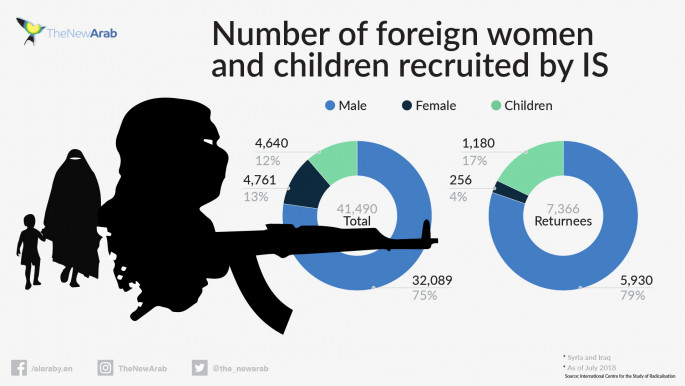
Shamima Begum and Sajid Javid's circle of (t)error
Kassig was a convert to Islam; most victims of Islamic State (IS) were other Muslims. Most IS personnel on the other hand were foreigners. IS was a colonising force trying to impose totalitarian rule on a local, primarily Muslim population.
Nothing about this should be attractive to a Muslim teenager. But if one were deceived or deluded into joining such an outfit, four years under its reign of terror, which included witnessing severed heads, should have erased its romance.
Shamima Begum however, is equivocal in her condemnation of IS, and from her confused ramblings, one gets the impression that she may have little to condemn had its fortunes not turned out so bleak.
Let us be clear: Fifteen isn't too young for a person to understand that beheading journalists and aid workers or enslaving women is morally repugnant; but youth is impulsive and circumstances can lead even the best into error.
By 19, however, youth can no longer be an excuse. Shamima Begum may have been groomed, but the presumption of innocence can't be indefinite. From her various statements, it is hard to find sympathy for her.
 |
The protection of the law cannot be denied to people we deem unsympathetic |  |
But sympathy is not a necessary condition for justice. The protection of the law cannot be denied to people we deem unsympathetic.
If such exceptions were to be universalised, the law would have to exclude not just criminals but also anyone suspected of crime. By revoking Shamima Begum's citizenship, the Home Secretary Sajid Javid has made an ass of the law.
In denying Shamima Begum her rights as citizen, Javid has violated Britain's own laws not to mention international law (under the British Nationality Act of 1981 and under international law, a government can't revoke a person's citizenship if it leaves them stateless). He has thereby rendered the whole notion of justice arbitrary.
Twitter Post
|
In terms familiar to all demagogues, Javid has justified his action on security grounds. His notion of security, however, is drawn less from expert opinion than from the froth issuing from the Daily Mail comments section.
But if the legal basis of Javid's action is dubious; his security rationale is plain wrong. Shamima Begum would face prosecution at home; her life would be monitored and constrained. She would pose no threat to society. Back in the UK, she could offer rich material for the study of radicalisation and help bolster efforts to combat it.
Read more: Bangladesh says 'non-citizen' Shamima Begum is UK's problem, won't let her in
Leaving Shamima Begum to her fate in Syria may not have a direct impact on British security, though it could send her underground and make her activities harder to monitor.
But it will certainly diminish Britain's image internationally and confirm the conviction among disenchanted Muslims that they are excluded from the state's protections. It will be as dangerous symbolically as Guantanamo, Abu Ghraib, and Bagram were a decade earlier.
None of these measures enhanced western security, but they did serve as symbols of western perfidy that helped radicalise an entire generation of jihadis.
There is no doubt that a double standard is at play here. We have yet to establish if Shamima Begum personally participated in any crimes.
But if she is being punished for her link to a military outfit that has participated in war crimes, then there is no reason why youth from Britain who go and join the Israeli army, whose crimes against the Palestinian people are well established, should be spared similar scrutiny.
Nor does it make sense for the government to revoke Shamima Begum's citizenship while Asma al-Assad gets to retain hers, despite her vocal defence of a regime that the UN has condemned for the "crime of extermination".
Justice should ideally be delivered by those the perpetrator has harmed or oppressed. But Syria is a failed state, which doesn't have a justice system; it has institutionalised injustice.
 |
She could offer rich material for the study of radicalisation and help bolster efforts to combat it |  |
Shamima Begum was born and radicalised in Britain. She is British responsibility - and she now has a child. Britain can't blithely wash its hands of this responsibility.
Sajid Javid's blatant disregard for legal and ethical norms is having the paradoxical effect of turning Shamima Begum into a cause celebre. It is displacing the outrage among many from the crimes of IS to the unreasonableness of British law.
This is a major own goal - and it lets IS off the hook. This, for good reason, offends Iraqis and Syrians who have suffered under IS terror.
 |
|
The only right - and responsible - thing for the British government to do, is to repatriate Shamima Begum and prosecute her for any crimes she might have committed, without foreclosing the possibility of rehabilitation.
Justice cannot be about retribution; it has to be about the common good. And the common good is best served by ensuring the integrity of the rule of law. This is where the British state can clearly distinguish itself.
The victims of the so-called "Islamic State" never received the presumption of innocence; IS was devoid of mercy. The British state can, and must, do better.
To quote Britain's greatest poet, "The quality of mercy is not strained… It is twice blest; It blesseth him that gives and him that takes". Britain needs to follow Shakespeare's advice and season its justice with mercy. It will take the wind out of jihadi proselytisers' sail and break the cycle of terror.
Muhammad Idrees Ahmad is a Lecturer in Digital Journalism at the University of Stirling.
Follow him on Twitter: @im_PULSE
Opinions expressed in this article remain those of the author and do not necessarily represent those of The New Arab, its editorial board or staff




